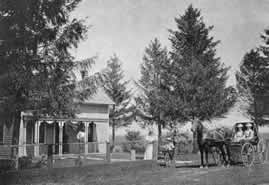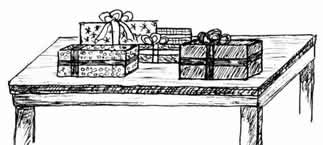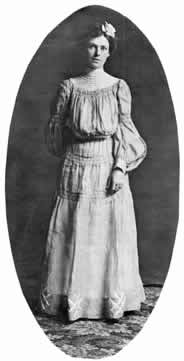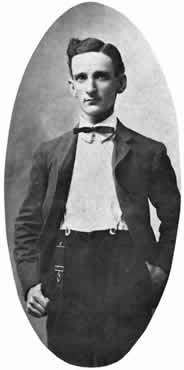 |
Volume III, No. 2, Winter 1975 |
THE SCHOOL MARM WAS A MAN!
One of the greatest joys connected with being an octogenarian is having lived in a time when so many things were quite different from today. Sometimes I find myself envying the young folks of the seventies who have so much freedom and so many advantages. And then there are other times when I feel sorry for them because they have missed the more simple pleasures of rural life at a time when it really was rural.
Now that I am a great-great aunt many times over, I am often asked by my oldest sister's descendents to tell what it was like growing up and dating back when their branch of the family first got started.
[4]
Although this is a Missouri story, it began in Iowa where all my brothers and sisters and I were born on a farm near a small town. At the time of our lives when my three older sisters were nineteen, seventeen and fifteen and my two brothers were seven years and six months, our father decided in 1902 to move us all to a farm in Missouri near his brother and family.
I had already started to school, at the age of five, the September before. We lived close enough to town so we could walk to the town school. And what a grand school it seemed to me with four big rooms on the second floor for the upper grades and the high school and four more on the ground floor for the lower grades. But the best part of it all was that I was something special to Miss Maple, the sweet middle-aged teacher who had started my sisters and brother out on their highway of learning.
So, naturally, having to leave her was my biggest heartache. But, for my mother and sisters, the whole move was a tragedy, particularly since all my mother's relatives--aunts, uncles and cousins--gathered at the depot when we left predicted all kinds of dire catastrophes awaiting us down in that backwoods country. My father, as was the custom of that time, had gone on ahead of us on a freight train which carried all our belongings which included the buggies, wagons, farm machinery, live stock and our best horses. It was left to my untraveled mother to herd us all on the train that evening for the inter-state journey which was to keep us on the road for over twenty-four hours. I truly believed that the relatives were right--we were going clear out of this world.
But, on the train ride to the next town thirty miles away, where we were to spend the night, I soon wiped away my tears so I could see the wonders of our rocking coach. The bright kerosene lamps hanging from the ceiling were swaying from the terrific twenty-five mile an hour speed of the racing train; the red-hot stove at one end of the coach glowed with a homey warmth as I snuggled down on the soft, red plush double seats and in spite of myself soon went to sleep. But I was wakened, much too soon, by big sister Pearl, who had me in charge, and was walked groggily off the train and up a hill to the frame, two-story small town hotel where we were all bedded down somehow. Of course, the two beds in our One room accommodation were reserved for mother and baby and the grown sisters. So, Loyd and I had to make do with a blanket on the hard floor--not at all like our usual soft, deep feather bed at home.
Fortunately, the night was snort as we had to get up at four in the morning to catch the through train to Missouri. This was even faster transportation and, when daylight came, Loyd and I sat with our noses pressed to the dirty windows, fascinated at the speed with which the telegraph poles raced by. My sisters, too, were all agog and kept pestering the conductor to tell them when we had crossed the state line. But, when we finally got to Missouri, they were all disappointed.
"Why, it looks just like Iowa!" they complained.
However, as we journeyed into the state, they began to notice high hills and tall trees which were new to them, after the flat and open plains of their native state.
"This is really pretty country", my sister Lyle admitted. "We don't have trees like that in Iowa. And some of them are evergreens too. I bet it will be fun to slide down those hills next winter. I don't see what's so bad about Missouri."
[5]
My tired mother, though, began to get homesick when we had to wait over for six hours that evening at a junction only twenty miles from our destination. She discovered there was a small hotel there where we could wait but the parlor was crowded with a dozen or so sad looking women sitting gloomily around the wall. Mother said later that she had begun to look around for a coffin for she was sure this must be a wake. It did not help any either when she found they were all waiting for a train to North Dakota where they would be homesteading.
"That was the last straw," she would always say in repeating this favorite story of hers. "What a terrible place we must be going to if the people are all leaving for the God-forsaken place. Why, they'll be living in sod huts."
But, when we finally arrived at ten-thirty that night and were welcomed by Father's bear hugs, we all felt much better. A relative, who lived in town, put us up for the rest of the night. We all found cousins to fit our own ages. Even those that were Loyd's and my ages were allowed to stay up to greet us. They showed us their playthings and slept on the floor so we could have their soft beds. In the morning we were all given a big breakfast of food we had never tasted before--hot biscuits with sorghum molasses and southern style country ham.
And what a grand school the Iowa school seemed to me with big rooms on the second floor for the upper grades and high school and four more on the ground floor for the lower grades. But the school in Missouri was a terrible place--just one room with a sort of stoop out in front.
We began to feel even more at home when our father loaded us all in our familiar roomy carriage, and our two old horses, Old Nell and Bess, pulled us up and down the hills to our new home.
Since Pearl had been to a normal school in Iowa and had taught school for a few months before we moved, she was very interested when Father pointed out the district school we would go to.
"That's a school," I said to myself scornfully. "Why it's nothing but a little black shack."
My sister teacher was even more interested that the school-marm lived in the big white house up on the hill.
"How nice," she beamed. "I'll certainly have to get acquainted with her."
We were all pleased with our new location, with its view of the river and the cedars on the big front lawn. The old frame house was bigger than the one we had left and very homelike. My brother and I wasted no time exploring the big red barn with its enormous hay mow over head. We embraced our favorite barnyard friends who had survived the move unharmed. They made us feel that we had really gotten home again.
But, the next day, Father decided we must be put in school. Naturally, Pearl was the one to take us as she could explain just where we should be placed in the school system--and, of course, meet the school-marm. I had always liked school. But this was a terrible place--just one room with a sort of stoop out in front and frayed wooden walls that were not even painted. And there was such a mixture of all sized kids out on the weedy playground. We didn't see any school teacher either, when we went inside, but pretty soon one of the larger boys came in from the playground.
[6]
"Good morning," he said with great dignity. "Did you all wish to enroll in the school?"
I looked at him in amazement. Was this the teacher? I had never heard of a man teacher. It couldn't be, but one look at my embarrassed sister told me it was true. And he had thought she was a new pupil! Her face got red, and mumbling something about putting Loyd and me in the second and first reader, she ran out the door without looking back or even telling us goodbye.
That left me feeling more like a deserted babe in the woods that ever. I had never been in a place like this before. I looked at the two rows of double seats on each side of the room. Each had a desk to write on and a place underneath for books, which was fastened to the back of the seat in front. There were big desks in the back for the older kids and smaller ones in front, where I was placed. The bare floor was splintery boards and there was a big pot-bellied stove in the center of the room where the teacher had made up a big fire before we arrived. It was a gloomy day and the small windows on each side of the room did little to brighten up the situation.
Before I had finished my scornful observations, the teacher stepped outside on the stoop and rang a hand bell. Then school "took up" with everybody singing a song I did not know. There was a row of benches in the front reserved for the class that was "reciting" and a small blackboard behind the teacher where the pupils worked out their arithmetic problems when called on. There was probably a book in front of me on my desk but, in these surroundings and with all these events going on, studying was the last thought on my mind. I wiggled and twisted in my seat, trying to see what was going on--especially in the back of the room. No one had ever told me it was a sin to turn around in one's seat at school until the tall, grim teacher came up behind me, picked me up and set me down hard facing the front, with the stern admonition to behave myself.
Oh, where was Miss Maple? Why, she even used to let me sit on her lap! The tears came as I put my head down on the desk and sobbed. How I longed to be back in my old familiar surroundings! Happily, the morning recess arrived about that time. We all went outside where I located Loyd and, grabbing him by the arm, announced that we were going home. He looked a bit stunned but, since he usually let me have my way, followed along as we slogged our way through the ankle deep Missouri mud on our way home, our overshoes forgotten back at the school house. Home looked like heaven to me as I threw myself in my mother's arms, sobbing out my tale of woe. She was inclined to be sympathetic but our usually understanding father took a different view. Though he had never whipped us, his threat to give us a good "thumping" was all we needed, for we had memories of those big fingers whacking us on the head after some misdemeanor. But this time we had gone too far. Without a word of any kind, those big fingers grabbed each of us by the ear and he marched us straight back to school. What a humiliation! He even gave the teacher permission to give us a whipping if he felt it necessary, adding that we would get a second one at home. (I was told later that this was the proper response of a parent when his children misbehaved at school.) But, fortunately for us, this teacher did not believe in corporal punishment so we escaped a physical reprisal this time. But, his scorn at our behavior and the torture of having the gleeful eyes of the other pupils focused on us was much worse.
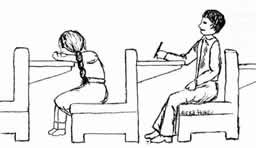
[7]
Somehow, though, I finally managed to adjust to this new world and found that school was not so bad really. I began to enjoy hearing the older pupils reading out of their Fifth Readers and there were many new things I was learning from all the other classes too that I would have known nothing about if I had been in a room with only the children of my own age. Even the "mean old teacher" was not as awful as I had thought he would be. He made our classes fun with his stories and even the slowest ones in our reading classes began wanting to read better when they found out books could be interesting. Then, too, he would plan special treats for us on Friday afternoons, when the big kids would have spelling and ciphering matches and we smaller ones would look on and pick our favorites to win.
I had a hard time following the ciphering matches for I was always smarter in reading than arithmetic, though it was fun to watch. The more advanced classes would choose up sides and a boy or girl from each side would go to the blackboard to be given a problem in addition, multiplication, subtraction or division. How they would fiqure--their fingers flying--to be the first to finish, and score a winning point for their side. I appreciated the spelling matches more. Each class, in turn, would line up and try to spell the words correctly that the teacher gave out. If anyone missed a word he would have to go the foot of the line but if he spelled every word right and the others didn't he would work up to the head of the line and get a Headmark. Or sometimes it would be a "spell down" and anyone missing a word would have to sit down. The last one standing up would be the winner.
There was much talk about a Box Supper to be held in the school house. Even we kids could come to that, along with our parents and other grown-ups. All the girls and women would decorate a box, filled with their best goodies, which would be auctioned off to the men to raise money for the school. No name would be put on the box but the girls would usually give sly hints about the size and color of their offering so their favorite swain would bid on the right box. This would give them a chance to show what good cooks they were. All of our family were going and both Mother and the girls were busy all day making their favorite dishes. Mother had bought a special treat for my box--a new kind of cookie, called Nabisco Wafer. The one bite I was allowed tasted like ambrosia to me. That night I would have a store boughten cookie.
The affair started off with the teacher sounding his pitch pipe and leading everybody in singing old familiar tunes. Then all the pupils, even we First Readers, went "up front", made our little bows and spoke our "pieces". Then, finally, the auction of the boxes began and my mouth began to water in anticipation of my Nabisco treat. The auctioneer got louder and louder while the competition for bidding on certain boxes mounted higher and higher. Teacher had been real busy all evening putting on our show but I noticed he was quietly watching the auction and ran the bidding up real high on one of the biggest boxes there. I had seen that box before--I had seen my sister Pearl decorate it that afternoon. I supposed that, being the teacher, he felt he should buy the biggest box and make more money for the school.
But I was getting sleepier and sleepier as the auctioneer droned on and the next thing I knew mother was shaking me and saying it was time to go home.
"Where's my box?" I asked.
"Some man I didn't know bought your box. I saw him going out the door with his wife and baby. The baby was crying real hard so I guess he felt he should not to stay to eat."
"And by now he has eaten up all my Nabisco Wafers", I moaned.
[8]
Another thing that made life easier for me at school was the changed attitude of Teacher. He was so nice to Loyd and me--so patient with Loyd, and never even looked cross at me anymore, no matter how much I fidgeted. It seemed like I was always finding him at out house, too. He would be playing our new piano my father had bought to replace the parlor organ that mother had taken lessons on years before. Now the girls were taking lessons too and would hang around Chester, as all of us had started calling him, who played the old tunes with chords and runs like I had never heard before. One time I noticed he had an old strip of cloth wrapped around a cut place on his finger. "I'm playing ragtime", he teased me. He kept the whole family laughing over his funny way of saying things. I was not told till later why he came to our house so much or what had started it all.
It seems that my teacher had observed my shy teacher sister at the church services that were held in the school house on Sunday afternoons. Then later, both sisters, Pearl and Lyle, were invited to a "sociable" at one of the neighbor's houses where they were to meet the young folks of the area. It must have been a fun party for they played a lot of games, like spin the bottle, charades and something they called Post Office. I had no idea what these games were then but Mother seemed to approve the charades--it was a kind of play acting with words, I gathered. However, she did not seem too pleased when something about Post Office was mentioned--it seemed to have something to with kissing. But both the girls said they had not joined in that game.
The custom at these parties was for the boys and girls to go to the party separately and then pair off to eat supper together. Lyle, who was always called the beauty of the family, had been getting lots of attention during the evening while modest Pearl stayed in the background. So when my two sisters were standing in line with the other girls, waiting to be chosen, what happened was quite natural. For, when Chester came up to them, he made a gallant bow and asked:
"Miss Welch, may I take you in to dinner?"
Since neither of them knew that "Miss" meant the oldest, and since the oldest one in this case was silent, knowing he surely meant the pretty one, Lyle spoke up at once.
"Which one do you mean?" she asked.
What could a polite young man do? "Why you, I guess, he mumbled, sadly.
But he learned, after that, to make his choice quite definite and could be seen lined up with the other young men on Sunday afternoons waiting to take their young ladies home. And it was Pearl who rode home with him in his father's best one-seater buggy drawn by the finest horse in the family's stable. On other Sundays, when there was no church, he would come by the house anyway in this fancy rig and take Pearl for a long buggy ride. They would be gone for hours and I could not imagine what they could be doing all that time. But Mother seemed to think it was all right and quite the proper thing for them to be doing--whatever it was. Pearl bloomed like a budding rose with all this attention. He escorted her to all the parties and even took her into town sometimes when the Normal School there was putting on a concert or a play. Some nights he would just come to see her and, as time went on, Mother always saw to it that the rest of us went to bed early so they could have the parlor to themselves.
The neighborhood group got together often for fun times. There were hay rides and picnics on the river in the summer. During the winter they would go ice skating on the river and when it snowed, the young people organized an impromptu bobsled ride. The bobsled was a wagon bed on runners instead of wheels, filled with clean fragment straw drawn by a pair of spirited horses with jangling sleigh-bells. The boys and girls kept warm with hot bricks and warm blankets to snuggle down under. No one minded the icy winds. These winter activities often ended up at our house for a taffy pull.
This was a perfect way to pair off, for after the hot syrup had begun to cool and harden, everyone buttered their hands and a boy and girl together would pull and toss the maple flavored mess till it was thick enough to cut into chewy pieces. I remember that it was quite a job the next morning to clean up the sticky kitchen floor, but Pearl didn't seem to mind.
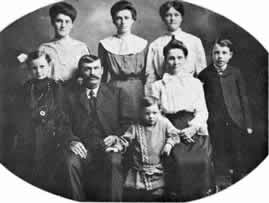
[9]
The wedding dress itself seemed to be the most important of all. Both Mother and Lyle were expert seamstresses but even they had to spend hours on planning and making this garment. As I remember, it was not a white gown and she wore no veil but was a soft brownish, silky material. It had a high collar and yoke--they called it a bertha--of lighter material with yards and yards of silk braid around the yolk and the flounced shirt.
I had a selfish interest in this coming wedding. I knew all about weddings for I had been to one back in Iowa and had never forgotten it because there was a flower girl, about my age, who wore a pair of white kid slippers. I had never ever seen any white shoes before but, when I asked for a pair, Mother assured me that when my sisters got married I could have some. So, now the time had come and I waited impatiently for my Cinderella slippers. No one mentioned the matter to me so I supposed they meant to surprise me. But there were more important matters on the adults' minds. The invitations had been made by phone, the supper to follow the ceremony had been planned, the house cleaned from top to bottom and a sort of altar draped with sheets had been set up in one corner of the front parlor. Then disaster struck--Loyd and I came down with the measles. Parents of small children sent in regrets by the dozen so the guest list was reduced to only aging parents and adult young folks. And, far from starring in my white slipper role, I and Loyd were only allowed to peak through a crack of the door at the ceremony.
[10]
What I could see was beautiful though. A friend of the bride played the wedding march as Pearl came down the stairs and another friend sang "Oh Promise Me". The bride promised to obey and the groom to cherish and then everyone ate some of the oversupply of food. It was a "lap supper". Everything could be eaten with a fork or fingers. There were chicken legs, potato salad, hot rolls and coffee. The wedding cake, which sat on the dining room table on a high glass stand, had been decorated by Lyle with hearts and flowers and was cut by the blushing bride.
The wedding guests finally left and we were all "redding up" the house and congratulating ourselves on the success of the occasion when we heard a terrible din outside--banging of tin pans, clanging bells and loud shouts. Our Iowa family began to looked scared and wondered what it was all about until Chester, who was looking mighty pleased, informed us it was a Chivaree. No country wedding was complete without one, he said, and a newly-married couple would feel very unpopular if their friends failed to finish off a wedding this way. He invited them in for refreshments, which was part of the ceremony, so the surplus food was taken care of. After doing a bit of teasing in the newly-wed's direction, they finally left and the married couple was able to go upstairs for the night. (I wondered why he did not leave with the rest of the guests.)
Old photographs of Welch Family courtesy of Gladys Welch Miller.
[11]
Copyright © 1981 BITTERSWEET, INC.
Next Article | Table of Contents | Other Issues
